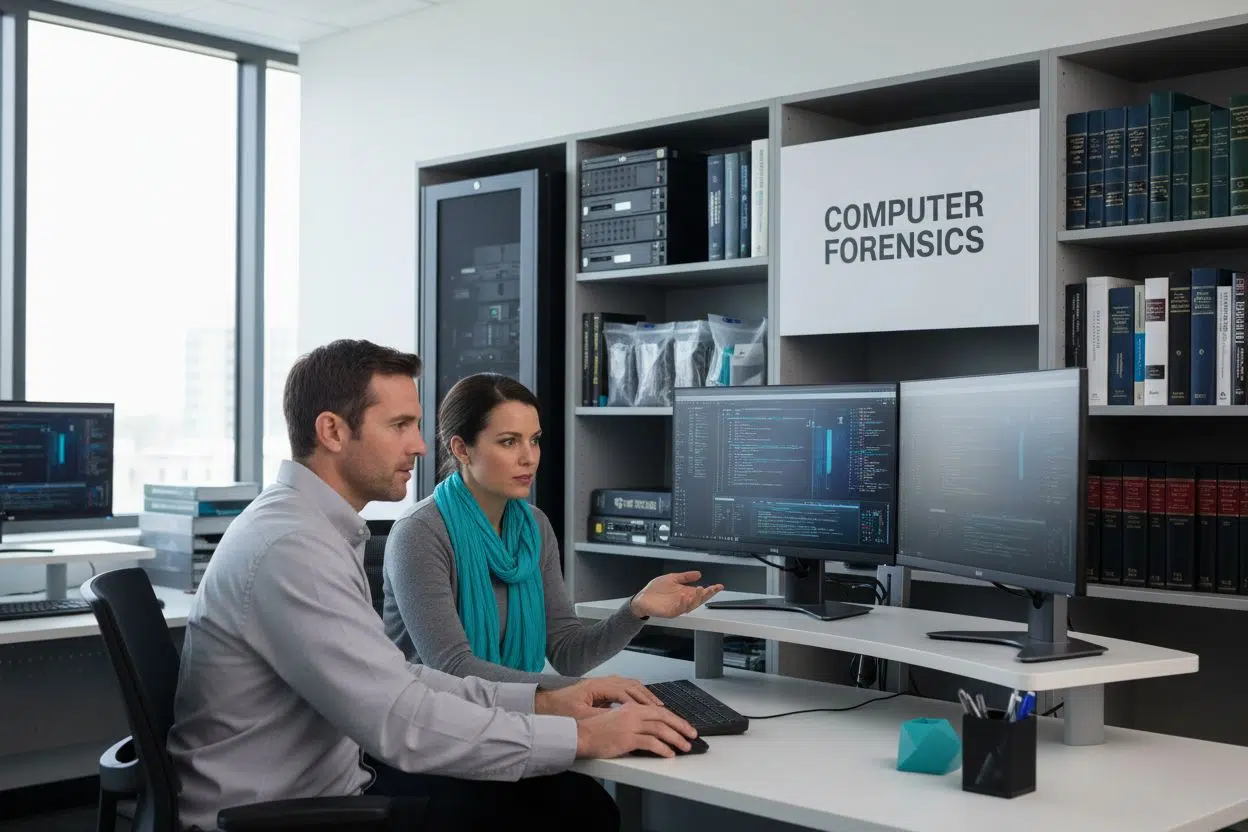Computer Forensics, helping and: How evidence-led digital investigation strengthens criminal and civil cases in the UK

computer forensics lab
In today’s technology-driven world, computer forensics has become essential to both civil and criminal litigation. As digital devices and cloud services proliferate, opportunities for fraud, misconduct, and cybercrime increase. For legal professionals, applying computer forensic techniques is crucial for uncovering digital evidence, strengthening cases, and ensuring justice is served.
What Is Computer Forensics?
Computer forensics—also known as digital forensics—is the scientific process of identifying, preserving, analysing, and presenting electronic evidence in a legally admissible manner. It covers computers, mobile phones, tablets, servers, and cloud platforms. The aim is to recover and interpret data without altering it, preserving authenticity for court.
Professionally conducted computer forensic investigations reveal the truth behind digital activity—retrieving deleted emails, interpreting system logs, and tracing communications across devices and platforms.
Core Elements of Computer Forensics
1) Evidence Collection
Investigations begin with defensible collection. Examiners create forensic images (bit-for-bit copies) to ensure the original media remains untouched. A rigorous chain of custody underpins admissibility.
2) Data Analysis
Using specialist tools, investigators analyse data to recover deleted files, reconstruct timelines, and detect manipulation or unauthorised access. Findings often include metadata, browser histories, chat artefacts, and file-system events.
3) Preservation
Evidence must be handled in a forensically sound way—preventing alteration, documenting every action, and storing material securely to maintain integrity.
4) Reporting and Expert Testimony
Examiners deliver clear reports and, where required, expert witness testimony to explain technical findings to the court.
Computer Forensics in Criminal Litigation
In criminal law, computer forensics supports investigations into fraud, harassment, hacking, and data theft. Digital evidence—from text messages and social media to GPS logs and financial records—helps establish timelines, identify suspects, and corroborate or challenge witness accounts.
Common Challenges
- Rapid Technological Change: New devices and formats can outpace existing tools and workflows.
- Privacy and Data Protection: Compliance with the Data Protection Act 2018 and UK GDPR is essential.
- Skills Shortages: Demand for experienced computer forensic experts can exceed supply.
Computer Forensics in Civil Litigation
In civil disputes, computer forensics is often decisive. Typical scenarios include:
- Contract and Commercial Disputes: Analysing emails and document histories to evidence performance or breach.
- Employment & HR: Investigating misconduct, data misuse, or harassment via company systems.
- Intellectual Property & Data Theft: Tracing unauthorised copying, exfiltration, or deletion of sensitive information.
eDisclosure and Electronic Evidence
The eDisclosure process is central to modern civil litigation. It involves identifying, collecting, preserving, and reviewing electronically stored information (ESI). Computer forensic specialists ensure defensibility by preventing spoliation, accelerating search and review, and explaining technical findings to legal teams.
Collaboration Between Legal and Forensic Teams
- Expert Testimony: Translating complex technical evidence for judges and juries.
- Streamlined Disclosure: Coordinated workflows that surface key evidence quickly.
- Stronger Strategies: Case theories grounded in reliable computer forensic evidence.
Related service: Mobile Phone Forensics (iPhone/iPad extractions, Cellebrite/GreyKey workflows, deleted message recovery, and cell-site analysis).
The Future of Computer Forensics
- AI & Machine Learning: Pattern and anomaly detection at scale.
- Cloud Forensics: Acquisition and analysis across distributed, multi-jurisdictional platforms.
- Mobile Device Forensics: Deep extraction of app data, messages, and location information.
Ethical and Legal Considerations
All computer forensics activity must remain lawful, proportionate, and transparent. Investigators should respect privacy, obtain appropriate authority, and maintain full audit trails to preserve evidential integrity.
Conclusion
Computer forensics provides the scientific foundation for understanding digital activity in both civil and criminal cases. By combining forensic expertise with robust legal strategy—and by following defensible procedures—courts gain clear, reliable insights that support fair outcomes.
Speak to a Computer Forensics Expert
If you’re a solicitor, barrister, company director, or private client seeking help with digital evidence, contact Computer Forensics Lab or explore our Mobile Phone Forensics services.
Suggested Internal Links